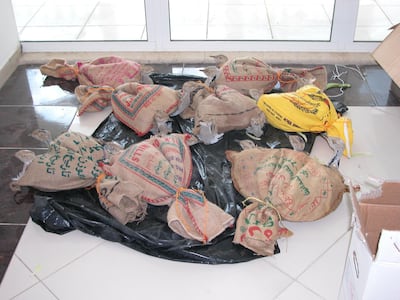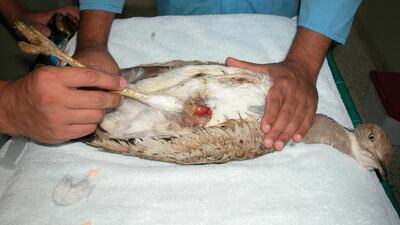Eleven houbara birds intercepted by customs officials in Ras Al Khaimah will be returned to the wild by conservationists.
A total of 12 endangered Asian Houbara bustards were seized by border control officers, who found the birds stuffed inside plastic bags and hidden inside a spare tyre.
One of the recovered birds had to be put down after vets discovered both of its wings and its internal organs were damaged.
Further post-mortem found traces of E-coli and traces of aspergillomas – a type of mould in its lungs.

“Had the infected smuggled houbara been eaten by a falcon, it may have proven fatal to the raptor,” said Majid Al Mansouri, managing director of the International Fund for Houbara Conservation.
“Our plan is to release the birds following the completion of their rehabilitation.
“As a migratory species, if we release them in the UAE we are giving them a chance to complete their migration back to their breeding ground.
“All birds will be fitted with satellite transmitters to monitor their movement and future migration,” he said.
Smuggled houbara typically carry diseases and suffer stress during their capture and illicit transportation.
In turn, severely sick houbara can endanger the lives of falcons during hunt training.
The illegal houbara trade represents a serious sanitary threat for the local fauna, including falcons. With only one in 10 wild houbara surviving being smuggled across the UAE border, the illegal trade is a significant factor in the historic houbara population decline and a threat to traditional Arabian falconry.
If convicted, smugglers face a potential fine of between Dh20,000 and 50,000, and imprisonment for six months.
The far greater threat, however, lies in the potential health implications for falcons.
Houbara bustards are endangered due to lost habitat and its popularity as prey for traditional falconry.
To counteract decades of declining population numbers across the 28 countries in the species’ range, the UAE has led global conservation for more than 40 years.
The Abu Dhabi-backed houbara breeding programme has produced in excess of 420,000 birds, with more than 300,000 for conservation release and falconry regulation.
Of these, more than 58,000 birds have been provided to falconers in the past 15 years to tackle the illegal houbara smuggling trade as practising falconry on captive-bred houbara alleviates hunting pressure on wild populations.
“Smuggling animals is a deplorable act and the IFHC condemns the actions of the individuals in this case,” said Mr Al Mansouri.
“Falconers need to understand they are putting their prized raptors at risk by exposing them to smuggled houbara which often carry lethal diseases.”


